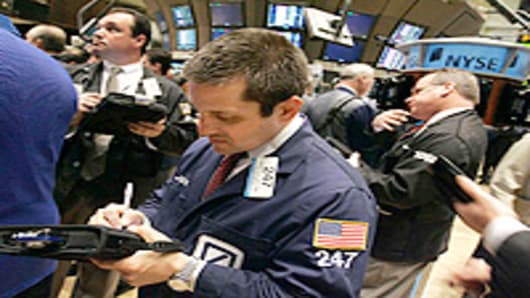"Corporate America has been playing the same game now for at least 10 quarters in a row. They set the bar where a three-year-old could get over it, then Wall Street dutifully follows the guidance and they beat every quarter. Until it stops happening, my guess is everybody's' numbers are too low," said Steve Massocca, Wedbush Securities managing director.
Besides earnings, economic news should helps stocks. "I think January will be a good month. February and March have to be determined, but I think January is going to be a good month, much like December was a good month," he said.
Goldman Sachs strategists Friday raised their outlook for the S&P 500 for 2011 to 1500, from 1450, based on the prospect of strong earnings. They also raised their earnings target for the S&P to $96 per share, which they note tops the previous high of $91 in 2007.
"We forecast that at year-end 2011 the nominal size of the U.S. economy will be 5 percent larger than today, the level of forward EPS will be 11 percent higher, the P/E will have expanded by 8 percent, or 1 point, and S&P 500 will be 19 percent higher," they wrote in a note.
Goldman's stock strategists are now at the high end of Wall Street forecasts for stocks for this year, but many strategist are bullish.
Bernstein said the bullishness among Wall street strategists reflects a second phase of the bull market, where investors become accepting of the move higher after a period of doubt. He said the same is evident in the inflows into equities mutual funds, positive for a second week in a row after a long period of outflows.
"Among the sell-side strategists, no one is predicting a new high on the S&P this year...I think that's because they are accepting what's going on but not to the point where they believe it's sustainable. There's still an immense fear of double dips and sovereign debt issues, and the myriad of concerns we still have," Bernstein said.
Stocks took in stride a disappointing monthly jobs report Friday, which showed non farm payrolls gained 103,000, well below most Wall Street forecasts, but better than November's revised 71,000. Yet economists still believe, the jobs picture is about to change as U.S. economic news continues to improve.
"I think as we go through the year, I think people are going to be pleasantly surprised at the improvement in the labor market in the next 12 months. I don't think we're going to see the labor market is strong, but it could improve more than people think," Bernstein said.
Euro Hazard?
The dollar had its best week since mid August, gaining 3.6 percent against the euro, which skidded to 1.2910 on snowballing worries about the sovereign situation. At the same time, commodities were highly volatile with gold dipping 3.7 percent to $1,368.50 per ounce. Silver lost more than 7 percent, and copper slumped 3.7 percent. Crude oil slid 3.7 percent for the week, falling to about $88 per barrel.
Spreads on some European sovereign debt were at near record wides to German government debt this past week, as markets worried about the financing ability of the weaker sovereigns. Another troubling factor was a European Commission proposal that would allow regulators to write down senior bank debt of failing banks.





